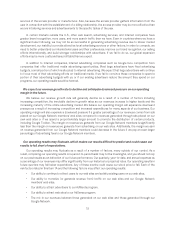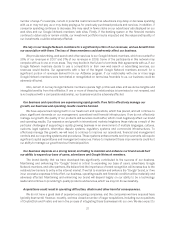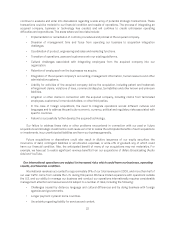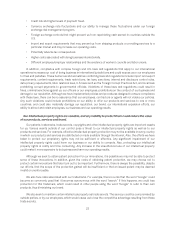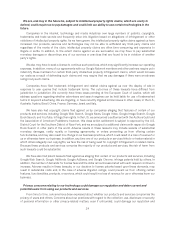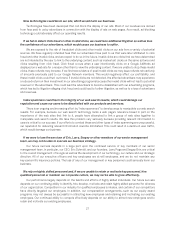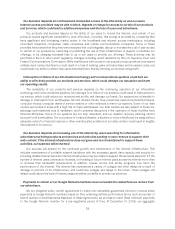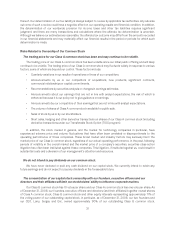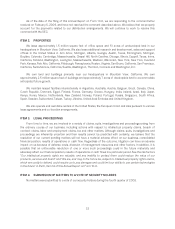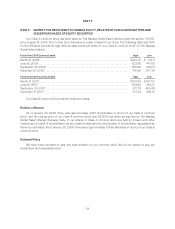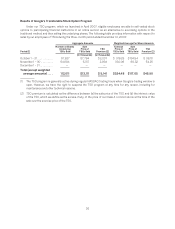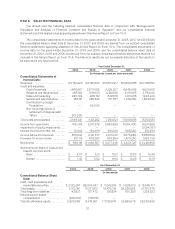Google 2008 Annual Report Download - page 43
Download and view the complete annual report
Please find page 43 of the 2008 Google annual report below. You can navigate through the pages in the report by either clicking on the pages listed below, or by using the keyword search tool below to find specific information within the annual report.New technologies could block our ads, which would harm our business.
Technologies have been developed that can block the display of our ads. Most of our revenues are derived
from fees paid to us by advertisers in connection with the display of ads on web pages. As a result, ad-blocking
technology could adversely affect our operating results.
If we fail to detect click fraud or other invalid clicks, we could face additional litigation as well as lose
the confidence of our advertisers, which would cause our business to suffer.
We are exposed to the risk of fraudulent clicks and other invalid clicks on our ads from a variety of potential
sources. We have regularly refunded fees that our advertisers have paid to us that were later attributed to click
fraud and other invalid clicks, and we expect to do so in the future. Invalid clicks are clicks that we have determined
are not intended by the user to link to the underlying content, such as inadvertent clicks on the same ad twice and
clicks resulting from click fraud. Click fraud occurs when a user intentionally clicks on a Google AdWords ad
displayed on a web site for a reason other than to view the underlying content. If we are unable to stop these invalid
clicks, these refunds may increase. If we find new evidence of past invalid clicks we may issue refunds retroactively
of amounts previously paid to our Google Network members. This would negatively affect our profitability, and
these invalid clicks could hurt our brand. If invalid clicks are not detected, the affected advertisers may experience
a reduced return on their investment in our advertising programs because the invalid clicks will not lead to potential
revenue for the advertisers. This could lead the advertisers to become dissatisfied with our advertising programs,
which has led to litigation alleging click fraud and could lead to further litigation, as well as to a loss of advertisers
and revenues.
Index spammers could harm the integrity of our web search results, which could damage our
reputation and cause our users to be dissatisfied with our products and services.
There is an ongoing and increasing effort by “index spammers” to develop ways to manipulate our web search
results. For example, because our web search technology ranks a web page’s relevance based in part on the
importance of the web sites that link to it, people have attempted to link a group of web sites together to
manipulate web search results. We take this problem very seriously because providing relevant information to
users is critical to our success. If our efforts to combat these and other types of index spamming are unsuccessful,
our reputation for delivering relevant information could be diminished. This could result in a decline in user traffic,
which would damage our business.
If we were to lose the services of Eric, Larry, Sergey or other members of our senior management
team, we may not be able to execute our business strategy.
Our future success depends in a large part upon the continued service of key members of our senior
management team. In particular, our CEO, Eric Schmidt, and our founders, Larry Page and Sergey Brin, are critical
to the overall management of Google as well as the development of our technology, our culture and our strategic
direction. All of our executive officers and key employees are at-will employees, and we do not maintain any
key-person life insurance policies. The loss of any of our management or key personnel could seriously harm our
business.
We rely on highly skilled personnel and, if we are unable to retain or motivate key personnel, hire
qualified personnel or maintain our corporate culture, we may not be able to grow effectively.
Our performance largely depends on the talents and efforts of highly skilled individuals. Our future success
depends on our continuing ability to identify, hire, develop, motivate and retain highly skilled personnel for all areas
of our organization. Competition in our industry for qualified employees is intense, and certain of our competitors
have directly targeted our employees. In addition, our compensation arrangements, such as our equity award
programs, may not always be successful in attracting new employees and retaining and motivating our existing
employees. Our continued ability to compete effectively depends on our ability to attract new employees and to
retain and motivate our existing employees.
27




